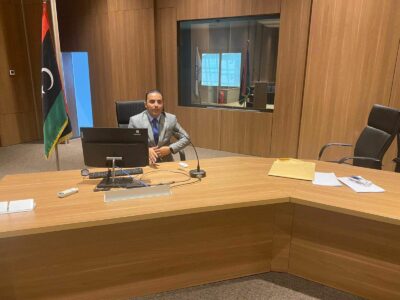Dbeibah is ready to appoint Ageila Elabbar as the new Foreign Minister.
Written by Piero Messina
A new road map in Libya elections. The country will vote in June 2022. After the flop on last December, Stephanie Williams, the UN special envoy to Libya, has indicated a new deadline. The goal is to have the presidential elections held by the end of June 2022. Now it is up to Prime Minister Dbeibah to put the governing body in order to complete this transitional semester. Dbeibah is trying to relaunch his government action by aiming above all to strengthen the country’s economy. The first objective is to restart oil production, blocked in recent weeks by the military maneuvers that led the Lybian National Army to control the entire Fezzan.
To carry out his task, Dbeibah is ready to change the government structure, giving space to “technicians” appreciated by all the elite of the country. The first move could be to entrust the Ministry of Foreign Affairs to Ageila Elabbar, a university professor in Benghazi and, in the recent past, cultural manager of the Libyan Embassy in Washington in the United States. Elabbar is considered the ideal character for a balanced dialogue both towards the internal forces of the country, and to coordinate the position of the government with the activities of the United Nations, in this period that will lead to the elections.
Elabbar could help restore serenity to the Libyan political world. The Benghazi university professor would be called to replace Najla El Mangoush, current Foreign Minister. El Mangoush is at the center of a tough institutional clash in Libya between the Government of National Unity and the Presidential Council, the two provisional executive bodies appointed last February by the Libyan Political Dialogue Forum (LPDF). El Mangoush was suspended as a precaution due to investigations launched by the Presidency Council (the three-member “college”, formed by President Mohamed Menfi and Vice Presidents Abdullah al Lafie Moussa Kuni). The Council accuses the head of Libyan diplomacy of having “represented foreign policy without coordination”. So, Elabbar’s appointment could therefore be good news for Stephanie Williams as well.
The United Nations envoy must be able to bring the various political souls of Libya to agreement within a few months.
In fact, in a televised interview with CNN, Williams said, “The UN Secretary-General has sent me specifically to support the electoral process, the nearly 3 million Libyans who have registered to vote, and 2.5 million of whom collected their vote registration ID cards. The Libyan Presidential elections must necessarily be held before the end of June of this year. This is because the political roadmap extends until June of this year, and elections must be held within this timeframe”.
Libya was supposed to hold its Presidential elections on 24 December 2021, in a United Nations-led effort to drag Libya out of its years of conflict. The ballot was delayed indefinitely, after bitter arguments over divisive candidates and a disputed legal framework. The Parliamentary committee overseeing the elections declared holding it “impossible” on the scheduled date.




